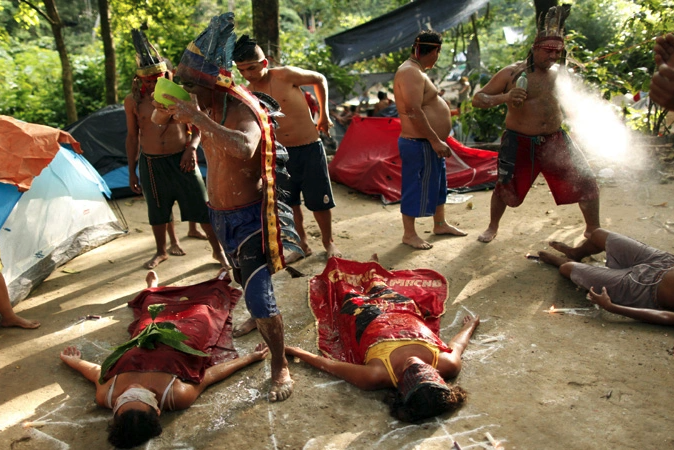Difference between revisions of "Template:Occult.live:Today's featured article"
Occultwiki (talk | contribs) |
Occultwiki (talk | contribs) |
||
| Line 1: | Line 1: | ||
[[File: | [[File:Maria-Lionza-Ritual.png|200px|left]] | ||
'''[[ | '''[[African diaspora religion]]s''' are a number of related beliefs that developed in the Americas as a result of the Atlantic Slave Trade. These belief systems are derived from traditional African religions mixed with influences from the more widespread organized religions. However, unlike [[Abrahamic religion]]s, African religions are not idealizations; instead, they seek to come to terms with reality. | ||
Because there are so many varied African diaspora religions and such diverse groups who contributed to their development, it is difficult to generalize about their beliefs and rituals. Also, none of these religions have a centralized authority who can dictate how devotees worship. Afro-American religions tend to involve ancestor veneration and include a creator deity along with a pantheon of divine spirits such as the Orisha, Loa, Vodun, Nkisi, and Alusi, among others. | |||
In addition to the religious syncretism of these traditions, many also incorporate elements of [[Christianity]], including reverence of Catholic [[saint]]s. Other major influences include: Native American religions, [[Spiritualism|Spiritism]], and [[shaman|Shamanism]] (sometimes including the use of [[recreational drug|entheogens]]). | |||
'''([[ | '''([[African diaspora religion|Full Article...]])''' | ||
Revision as of 18:17, 24 March 2025
African diaspora religions are a number of related beliefs that developed in the Americas as a result of the Atlantic Slave Trade. These belief systems are derived from traditional African religions mixed with influences from the more widespread organized religions. However, unlike Abrahamic religions, African religions are not idealizations; instead, they seek to come to terms with reality.
Because there are so many varied African diaspora religions and such diverse groups who contributed to their development, it is difficult to generalize about their beliefs and rituals. Also, none of these religions have a centralized authority who can dictate how devotees worship. Afro-American religions tend to involve ancestor veneration and include a creator deity along with a pantheon of divine spirits such as the Orisha, Loa, Vodun, Nkisi, and Alusi, among others.
In addition to the religious syncretism of these traditions, many also incorporate elements of Christianity, including reverence of Catholic saints. Other major influences include: Native American religions, Spiritism, and Shamanism (sometimes including the use of entheogens).
